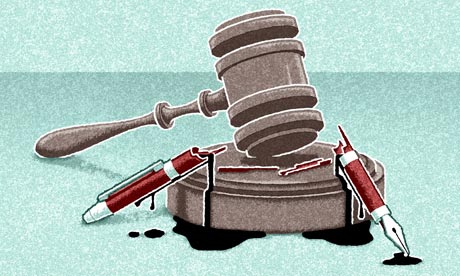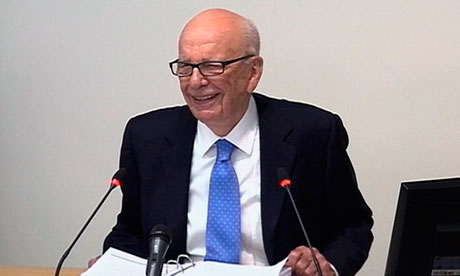This new press regulator is all about revenge, not justice. It's hard to imagine a more chilling deterrent to serious investigation

Illustration by Matt Kenyon
We can agree that the press had it coming. The victims needed revenge. Celebrities wanted redress. A few tabloid moguls got a bloody nose, and Ed Miliband got to meet Hugh Grant.But what happened on Monday in Westminster was a ludicrous way to engineer a more disciplined press. We do not have an independent regulator, but the agency of a political stitch-up. Any MP who claims this is not statutory regulation is a liar, and should be forced to retract and apologise, or face a million pound fine.
Press laws should not be written in the dead of night by a coalition of those worsted by newspapers. They have produced not just a royal charter, which might be no big deal, but a detailed remit of how a press regulator should operate, down to the prominence of apologies and the size of fines. MPs on Monday were salivating with regulatory power. The truth is that parliament was drinking deep from the well of disgust and revenge. As the veteran MP Peter Lilley bravely remarked, whenever parliament gloats over such deals "we invariably make our worst blunders".
Last month the distinguished US journalist Lawrence Wright came over to seek British publication of Going Clear, his detailed exposé of Scientology already published in America. He was told by publishers to forget it. His book was not reckless or inaccurate, but the Scientologists would make defending its publication in a London court prohibitively expensive. He went home empty-handed. As Chinese communists can attest, there are many ways to kill free speech short of murder.
Any regulation of the press should pass the Wright test. Will it make publishing what someone, somewhere does not want to see in print more or less likely? This week's legislation patently means less. A few innocent victims of press unfairness may gain redress. But the cheering across town this week is from the rich, the celebrated and the powerful, with parliamentarians in the van.
This debate has been dominated by the crime of phone hacking, largely at News International. Not a news report fails to mention it. This is an illegal activity that, under existing law, has seen dozens of journalists and police officers arrested and massive compensation paid. A paper has been closed, and exemplary punishment meted out. It needed no royal charter or late-night deal.
Certainly, those who complain if papers break statute or common law deserve a better route to justice. Britain is already tough on libel, defamation and privacy, as the Wright case illustrates, but the law tends to be for the rich. The appropriate reform is for these cases, if not resolved voluntarily, to come before a small claims court, to avoid the present deterrent of legal fees. That is the solution.
This week's proposals have no bearing on this at all, any more than did the tedious Leveson report. They are not about press illegality but something mysteriously called "misdemeanour" – that is scurrility, intrusion and unfairness. No one might complain here about a tougher monitoring of a code, to reprimand and seek apology. The existing complaints procedure works without fines and compensation, and merits strengthening. But we have to accept that sometimes there will be mavericks who are beyond reprimand. Free speech within the law is their entitlement.
The new regulator allows no time for this. Parliament sees no role for mavericks. Its target is not just celebrity intrusion but bias, unfairness and gossip in the style of Private Eye and the "off Fleet Street" plethora of news-and-comment websites. The regulator is obliged to offer a free arbitration service to anyone who feels traduced or unfairly treated by the press, imposing fines and compensation. Indeed, the service will have a vested interest in fines as it will be financed by "fine farming", like traffic wardens.
Parliament on Monday proposed no safeguards against this becoming a PPI-style stampede for anyone – including lobbyists – trying to grab a compulsory correction plus aquick payoff. Fining journalists for unethical deeds is a charter for the vexatious. It is madness. Fines and compensation at the arbitration stage will put editors in thrall to chief executives and nervous publishers.
Worse ensues if editors reject the new regulator and, because a matter of law is at stake, the case goes to a proper court. They there face punitive "million-pound" fines. Smaller publications and many in the provinces could be forced into closure. Almost by definition, such matters are likely to be seen by journalists as ones of principle. It is hard to imagine a more "chilling" deterrent to serious press investigation than this.
This is blatantly one-sided justice. It is as if the BBC charter were drafted by victims of Jimmy Savile, or church law drawn up by those abused by priests. It will certainly make some sections of the press more careful in their handling of the private lives of public people. But the baby's gone out with the bathwater. Northcliffe's maxim was that "news is what somebody somewhere wants to suppress; all the rest is advertising". The advantage today is with the advertisers, who will find it that much easier to stifle criticism and deter journalistic risk.
This is not the end of the world, and any such suggestion will sound self-serving from British papers. But, unlike the supine press so common abroad, they still have the irreverent vigour and diversity of a true political safeguard. This has been a grim, vengeful saga. The press faces tough times anyway, and must now do so wearing a ball and chain.


